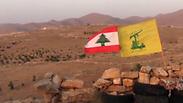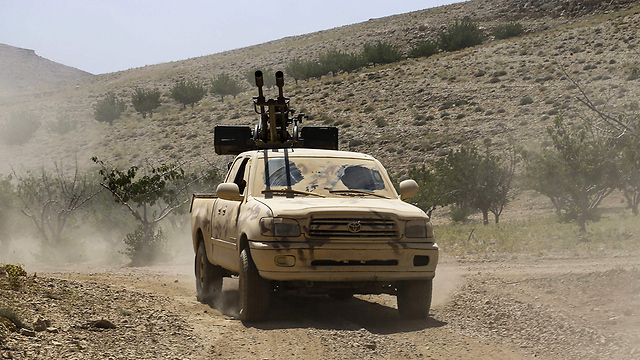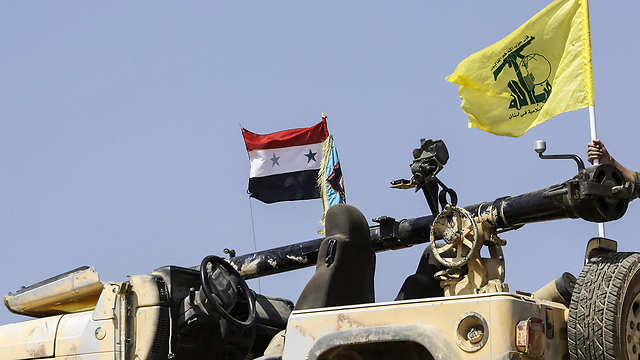
Once ISIS is eliminated, Hezbollah will take its place
Analysis: Libya, Egypt, Lebanon, Syria, Iraq, Saudi Arabia and Yemen are all up to their necks in wars taking place in their territories or near their borders. After the war on jihadist terror is over and the Islamic State is destroyed, Hezbollah will become the region’s leading terror organization—and a close and imminent problem for Israel.
The Arab states have no time to deal with the Palestinian issue, as they are up to their necks in the wars taking place on their territories or near their borders. Libya, Egypt, Lebanon, Syria, Iraq, Saudi Arabia and Yemen have all been in a state of war for several years now. What’s happening in these countries right now? Who will be the leading terror organization in the region after the Islamic State (ISIS) is eliminated? And are these wars related to Israel?
Lebanon: In Hezbollah’s claws
The main headlines in the past week or so have been covering Hezbollah’s war in northeastern Lebanon, in the Arsal area, which has been controlled for three years now by Syrian rebels who invaded Lebanon. The crisis experienced by the opposition organizations and the Gulf states’ blockade on Qatar, their main funder, have only hastened Hezbollah’s victory.

Intoxicated with victory, Hezbollah activists have warned that Arsal is just an exercise for of a war with Israel. Senior members of the organization have even compared their war to the Iraqi army’s victory over ISIS in Mosul. Commentators in the Sunni world have warned that the real goal of Hezbollah’s operation is to perform an ethnic cleansing and expel not only the al-Nusra Front organization (which is now called Fateh al-Sham) to the Syrian city of Idlib, but the entire Sunni population. It plans to replace them with a supportive Shiite population, as it has done in areas conquered by Hezbollah in Syria.
The military operation in Arsal was preceded by a Hezbollah incitement campaign against the Syrian refugees in the area and a demand to return them to their country. The organization’s brainwashed fighters are seen in videos distributed online from the Arsal area, cursing the Sunni religion and chanting messages of support for Iran’s spiritual leader, Ayatollah Ali Khamenei, as well as performing a Nazi salute.
The operation is expected to end with a destruction of the Sunni area bordering the Shiite Baalbek district, which has been “interrupting” Hezbollah’s efforts to transfer fighters and weapons into Syria. Lebanon’s Sunni prime minister, Saad Hariri, visited Washington recently. While Hariri is interested in disarming Hezbollah, he is incapable of complying with US President Donald Trump’s demand to do so.
Hezbollah is taking advantage of the Lebanese army’s weakness and of the Syrian army’s erosion. The Syrian and Lebanese armies are watching Hezbollah’s activities without doing anything, and are occasionally even providing the organization with aid against “terror.”
Hezbollah has established permanent bases on Syrian soil and it strives to open a new front against Israel in the Golan Heights border in the future. The Quneitra area, however, is still controlled by opposition organizations.
Syria: Dividing the ‘Islamic State’
The war on ISIS gained a lot of momentum this year. There is currently a competition taking place over the ISIS areas between Syrian President Bashar Assad’s Russian-backed army, on the one hand, and the US-backed Kurdish forces on the other hand. The war is focused on the Deir al-Zur area in eastern Syria, the country’s oil center. The forces loyal to the United States, the Kurds and Sunni rebel organizations helping them, are about to conquer the capital of ISIS, al-Raqqa, and the northern part of the “Islamic State.” At the same time, the Syrian army and Hezbollah are moving forward with the Russians’ help from the Palmyra area to southern Deir al-Zur.
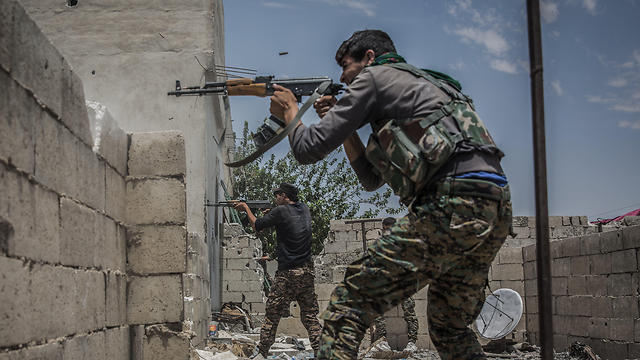
There are two main dangers hovering in the air right now. The first is that the Syrian regime’s forces will clash directly with the Kurds. Battles between these camps have already begun in recent months north of Aleppo. The second and greater danger is that American and Russian planes, which are bombing ISIS bases without any coordination, will end up in a direct clash. A victory over ISIS won’t end the civil war in the country, which has been going on for six years, but will lead to a new stage and maybe even turn Syria into a sort of confederation, in which the Assad regime will have direct control over one-third of the country only.
Iraq: The post-ISIS problems
Iraq is a few steps behind Syria when it comes to the war on ISIS, as the battle for the organization’s capital in the country—Mosul—has already been decided. ISIS is now fighting for its last areas in the country, and its fighters are withdrawing towards Syria. Now, as the clouds of smoke of the war are fading away, and as the Iraqi army ends its celebrations, the Iraqi people are dealing with a reality of an ethnically and economically split society.
The Sunni population in eastern Iraq is suffering from a refugee crisis and poverty, the cities which have been subject to battles for many months are destroyed and ruined, and Shiite militias are abusing the population under the excuse of “a war on terror.” As far as the Shiite militias are concerned, every Sunni person is suspected of supporting ISIS.
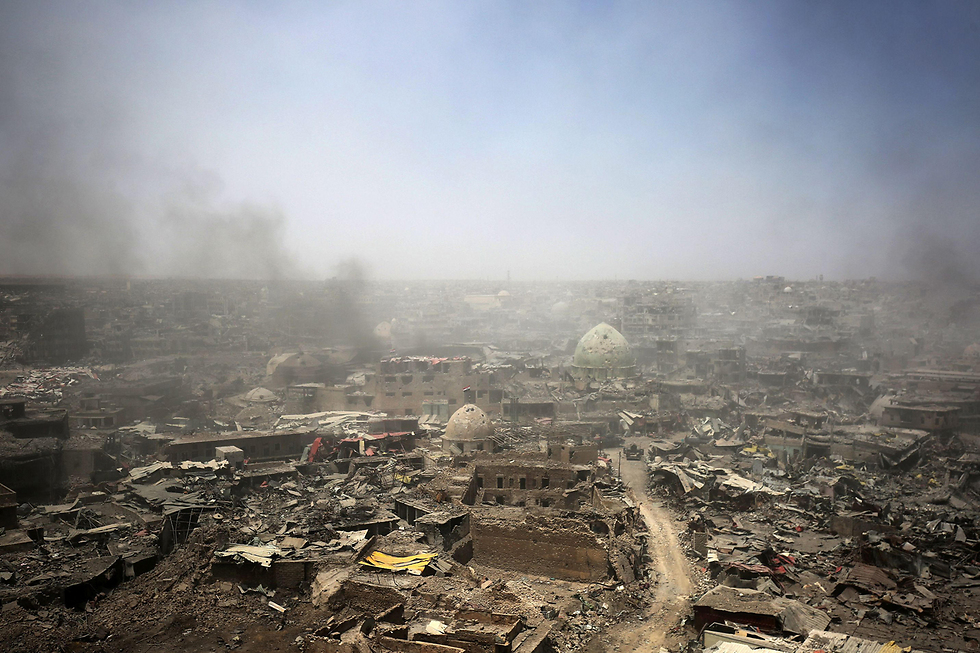
While eastern Iraq is more homogenous and mostly Shiite, there are great economic-political tensions there between Shiites who support Iran in Baghdad and control the politics, and poor Shiites in the south who oppose and accuse them of corruption. Muqtada al-Sadr, the leader of the anti-Iran faction recently held a defying visit to Saudi Arabia, Iran’s main rival.
Like in Syria, the Kurds in northern Iraq stand to gain the most from the crisis. They have America’s support and have been sustaining an autonomy for 12 years now. In June, the Kurds held a referendum in which they decided to establish a Kurdish state in September. It will be interesting to see how this move affects the Kurds in northern Syria. Will they join? How will Turkey react?
Yemen: The Houthis—Saudi Arabia’s Hezbollah
Two years have passed since Saudi Arabia launched Operation Decisive Storm against the Shiite Houthi rebels in Yemen, and the end is nowhere in sight. Commentators in the Shiite world have described the war as follows: “The richest country in the Middle East is bombing the poorest country in the Middle East.”
While Saudi Arabia has scored a huge achievement by preventing Iran’s allies from taking over all of Yemen, saving the oil routes around Yemen and leaving the important ports in the hands of the Sunni official government, there have been no signs of surrender from the Houthis, who are occasionally even launching missiles into Saudi territory.
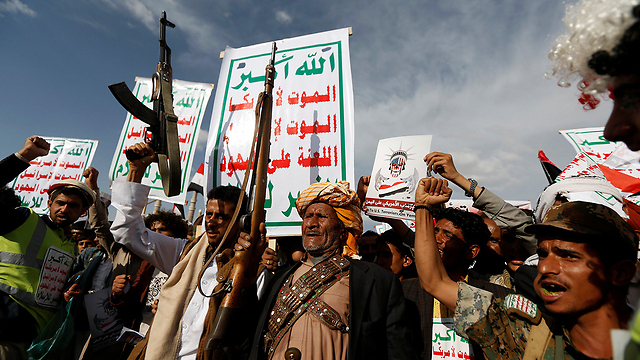
The Houthis still control about one-quarter of Yemen’s territory in the northwest, centered in Sanaa and Saada. They dominate the important oil fields and are threatening Saudi Arabia’s border. Now, the war on the ground is focused on the city of Taiz, north of Aden.
If the forces of President Abdrabbuh Mansur Hadi manage to conquer the city with the help of Saudi planes, they will burst forth towards the capital of Sanaa. The civil war in Yemen has been used by the al-Qaeda organization to take over desert areas in the center of the country. These jihad organizations are a chronic disease in Yemen, and dealing with them will be as difficult for the Saudi coalition as it has been with the Shiite rebels.
Egypt: Surrounded by terror, fighting poverty
In Egypt, it’s impossible to separate between the huge Arab country’s two main diseases: Terror and the economic crisis. Terror is ruining the economy and driving tourists away. Egypt has dangerous borders: Libya in the east and Sinai in the west. While the Islamic State branch in Libya has been eliminated, it’s still neck-deep in a civil war between other jihadists, rebel tribes and two governments in the east and in the west.
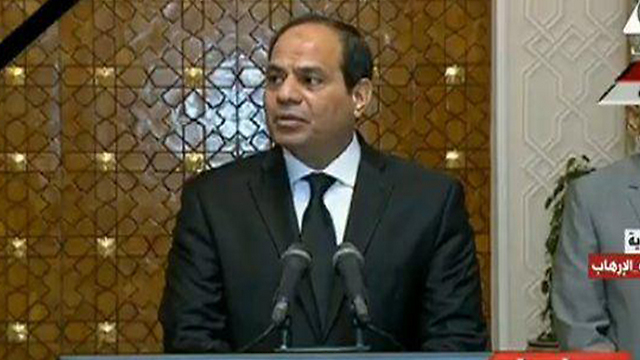
In the Sinai Peninsula, the Egyptian army is putting a lot of effort into defeating ISIS, but it’s hard to get rid of the Sunni terror organization while the main problem—the poverty and unemployment among the northern Sinai tribes—is not being dealt with. The steps taken against Hamas and the crossings from the Gaza strip have not prevented the transfer of weapons to jihadists in the peninsula. Terror is not letting go of the country despite the oppression of the Muslim Brotherhood, and the unemployment rate, the prices and inflation are persistently growing.
Things appeared to have calmed down in recent months, but then the latest terror attacks against Coptic churches in Tanta and Alexandria came along and proved that there is still a long way to go. There is room for optimism, however, as the elimination of ISIS in Syria and Iraq will directly influence ISIS in Sinai.
Jihadists will be gone, Hezbollah will grow stronger
As far as Israel is concerned, the developments in the wars on terror are positive, apart from the development that has to do with Hezbollah. The organization is receiving regional legitimization from Syria, Iran and Russia, as well as local intra-Lebanese legitimization from different ethnic groups, due to the fact that Hezbollah is successfully fighting Sunni terror organizations that are threatening to invade Lebanon.
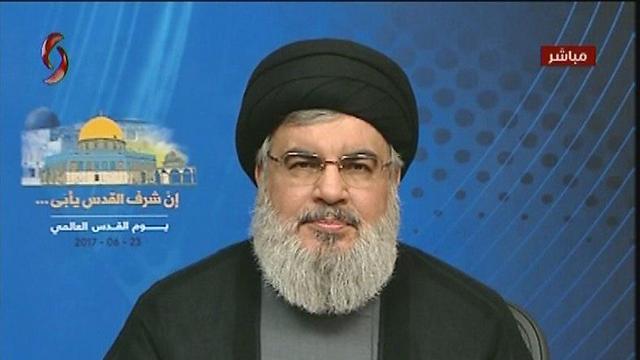
The price of Hezbollah’s assistance against the jihadists is high. The organization has permanent bases in Lebanon and Syria. The Houthis in Yemen, whose slogan is “Death to America, death to Israel, a curse on the Jews,” are highly inspired by Hezbollah and have even promised to help the organization in the future in its war on Israel.
After the war on jihadist terror is over and the Islamic State is destroyed, Hezbollah—which has tens of thousands of fighters, modern weapons, thousands of missiles and an improved brainwashing and propaganda system—will become a region-wide problem as big as ISIS. Unlike the Islamic State, this will mainly be a close and imminent problem for Israel.













